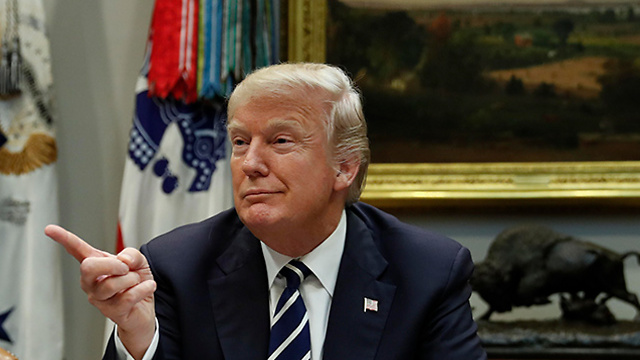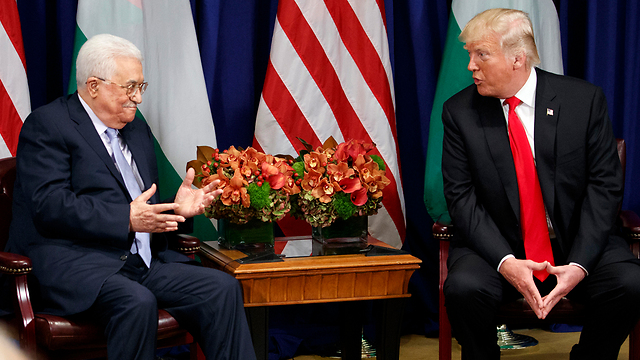Op-ed: Freezing UNRWA’s funding sources may satisfy the American president’s unclear vindictiveness, but it definitely won’t solve the refugee problem and will only add fuel to the fire of regional instability.
The Trump administration’s policy of tweets and impulsive speech reached UNRWA last week. After a series of threats against the Palestinians in the US president’s tweets, the punishment arrived in the form of a decision to suspend American funding to the United Nation agency for Palestinian refugees.
We must remember that the debate over the US aid to UNRWA isn’t new, and that it gained momentum after the Palestinians appealed for national recognition in the international institutions. The latest move, however, not only exceeded the boundaries of that debate but took the sting out of it.

Instead of a legitimate debate, the Trump administration pulled out an unhelpful stick against the Palestinians, which only causes further damage. The Palestinians are again seen as the victim, while the American president is seen as a bully who strikes anyone whose doesn’t accept his declarations, especially the one about Jerusalem.
There are two key arguments against UNRWA: First of all, that the agency perpetuates and magnifies the Palestinian refugee issue; and second, that its institutions help Palestinian terror directly or indirectly, like they did several times during Operation Protective Edge.
Having said that, UNRWA remains the main body dealing with a problem that has yet to be solved. As a result, since its creation in December 1949, the UN keeps renewing its mandate. Even the Israeli government knows that the aid provided by the organization to refugees in the fields of education, health, welfare and a variety of social services has prevented a deterioration to a humanitarian catastrophe in the Gaza Strip, which we all stand to lose from. UNRWA’s activity in Jordan, for example, is essential for maintaining stability in the country—America and Israel’s ally.
An open Palestinian wound
Many people in Israel hope that shutting down UNRWA will put an end the Palestinian refugee problem once and for all. But this is an open Palestinian wound, which hasn’t healed since 1948 and won’t heal without an agreement that will provide a permanent solution for the problem. Freezing UNRWA’s funding sources may satisfy the American president’s unclear vindictiveness, but it definitely won’t solve the refugee problem and will only add fuel to the fire of regional instability.
The UNRWA stick, which was pulled out as an attack on the angry Palestinian reaction to the Jerusalem announcement, was preceded by another tweet in which Trump wrote that Jerusalem had been taken “off the table,” the same table the Palestinians are refusing to return to after one of their main demands was unilaterally removed from it. There isn’t a single Palestinian leader who would agree to give up Jerusalem, and Trump definitely can’t decide that the Palestinians must give up their capital.

Trump’s only achievement, therefore, is removing himself from the table. That’s possibly what he wants, so he can keep talking about his desire to reach an “ultimate deal” without feeling obligated to provide results. This is an important lesson about the difference between a negotiator and a mediator. Trump is having trouble understanding that the Palestinians aren’t saying no to negotiations; they’re saying no to negotiations led by Trump.
Reality, however, is determined on the ground—not on Twitter. Unlike Trump, the absolute majority of the world’s nations have made it clear that Jerusalem is and will remain “on the table,” until Israel and the Palestinians reach a permanent agreement in which the city will serve as the capital of both states.
Presidents come and go, but our conflict with the Palestinians will remain, and solving this conflict is an Israeli existential interest. The reality of an occupation and an ongoing conflict harms not only the Palestinians, but the Israelis as well.
Throughout the years, as a true friend of Israel, the United States wisely maintained its ability to serve as a fair mediator trusted by both sides, the Israeli and the Palestinian. The American president’s conduct, however, is only making both sides toughen their stance. The Israeli Right, which enjoys Trump’s support, wishes to advance annexation moves, while the Palestinians, who are feeling attacked, are further entrenching their radical opinions.
We Israelis must stop applauding the American stick policy towards the Palestinians. Punishing the Palestinians with tweets and budgets won’t make the refugee problem—or their national aspirations—go away. It will just make everyone more frustrated and, as a result, more radical.
As reported by Ynetnews
